‘Fallout’ Star Ella Purnell Looks Ahead to Season 2: “I Just Don’t Know How She’ll Fare”
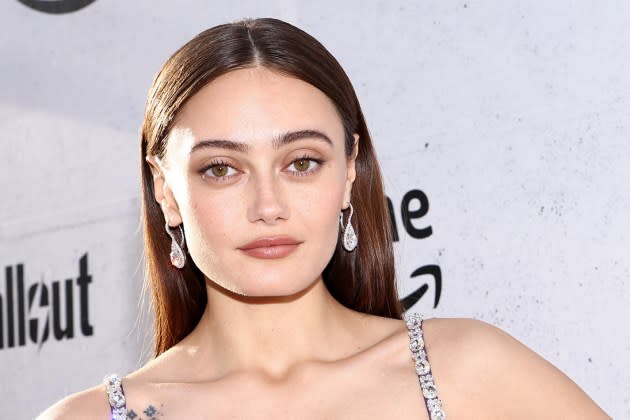
[This story contains spoilers from Fallout and Yellowjackets.]
As Ella Purnell was in the middle of shooting her future hit series Fallout, she found herself pining away for the circle of friends she had formed by way of her previous hit series, Yellowjackets. The English actor had joined the Showtime series knowing full well that her starring role as Jackie Taylor, the captain of the Yellowjackets soccer team, would conclude with her dramatic death in the season one finale. But as Purnell bonded more and more with her fellow Yellowjackets actors, her one-season role, initially a selling point, became less appealing. So she tried to reverse course and prolong her stay in the inhospitable wilderness where the desperate teenage characters have to resort to cannibalism as a means of survival.
More from The Hollywood Reporter
“I was like, ‘It’s only a one-year deal. I’m not locked into a seven-year contract.’ So, at the time, that seemed really appealing. And then when we started filming — I didn’t want to die,” Purnell tells The Hollywood Reporter. “I tried to convince the writers to keep me on the show a bit longer. So they thought about it, and then they called me and were like, ‘She’s got to go. We tried. We did our best.’”
Yellowjackets had become a bona fide hit upon release in November 2021. It struck a chord in the zeitgeist and with each passing week and episode, you could feel its momentum gaining steam. The show’s success created a bittersweet feeling for Purnell, who knew that her ticket had already been punched. But a couple of months after the gut-wrenching season one finale — in which Sophie Nélisse’s Shauna held Jackie’s lifeless, frozen body in her arms — Purnell was cast in the lead role of optimistic post-nuclear Vault Dweller Lucy MacLean on Amazon Prime Video’s much-anticipated adaptation of the Fallout video game series.
The post-nuclear apocalypse series boasted an impressive list of creatives and collaborators, including EP/director Jonathan Nolan, EP Lisa Joy, co-showrunners Geneva Robertson-Dworet and Graham Wagner, as well as Walton Goggins as the Ghoul/Cooper Howard and Kyle MacLachlan as Lucy’s father, Hank. As a result, Purnell assumed that she’d have to face numerous obstacles en route to being cast.
“It was obviously very flattering. I thought I’d have to screen test and get flown out and do all these things, but they were like, ‘No, it’s you.’” Purnell recalls. “And I was very nervous to hear that. My first words were, ‘Are you sure you don’t want me to audition again, just to make sure?’ But here we are, somehow.”
As for that longing that she felt in the midst of Fallout’s production — which took her from New Jersey, New York and Utah to Namibia — it was cured when Fallout and Yellowjackets’ producers carved out a day for Purnell to fly to Vancouver and shoot out a few scattered appearances on Yellowjackets season two — which played out in ghost form, and later for her character as a corpse.
“I definitely missed [the Yellowjackets cast] and I got serious FOMO, but then they had me back for a couple of episodes and that scratched the itch,” Purnell says.
Fallout has since become Prime Video’s second-most-watched series of all time, totaling 65 million viewers in its first 16 days of release, according to Amazon. The series was quickly renewed for a second season on its eighth day of availability. Purnell isn’t sure what’s next for Lucy now that her world has been turned upside down upon learning the revelations that — spoiler alert — her father not only had a direct hand in creating the nuclear apocalypse, but he also bombed a thriving post-nuclear city where her mother tried to raise her and her brother.
That discovery re-raises one of the series’ central questions as to whether Lucy, in the wasteland, can maintain the inherent goodness that she’s shown her whole life.
“Part of me thinks she’ll always be Lucy, and the other part of me wonders how anyone can survive that betrayal and hurt and trauma,” Purnell says. “Her entire world has just been ripped apart and ripped at the seams. It crumbled in front of her in a second. She’s always had such strong core beliefs, but they were rooted in her dad. So, when you take away that base foundation, I just don’t know how she’ll fare, I just don’t know.”
Below, during a recent FYC conversation with THR, Purnell breaks down the aforementioned climactic scene at the Griffith Observatory where she learns the truth about her father and the complicity of Vault-Tec.
***
I’d like to set the stage for how you got here. You landed a starring role as Jackie on Yellowjackets and the pilot was shot at the end of 2019, which was 18 months before you got to go back and shoot the first season. When did you learn that Jackie would be the big sendoff in the season one finale?
I knew with my first audition. I knew that was always the deal. I was pretty cautious about TV and so, at the time, that seemed really appealing. And then when we started filming, I didn’t want to die. I really liked everyone, and I really liked my character, and I tried to convince the writers to keep me on the show a bit longer. So they thought about it, and then they called me and were like, “She’s got to go. We tried. We did our best.”
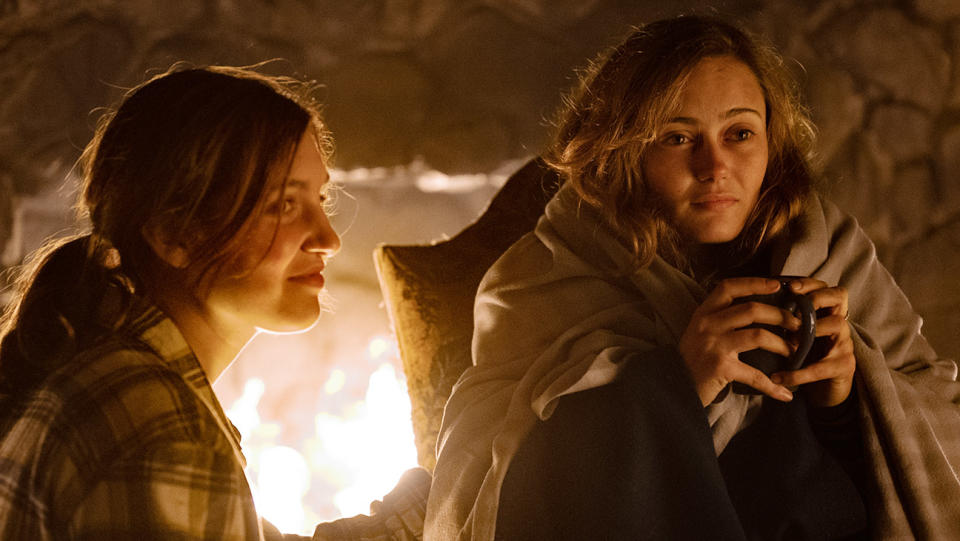
When the show became a smash hit during season one, was it bittersweet for you since you knew your exit was forthcoming?
Yeah, it was. It was a totally new experience for me. It was hard watching everyone go back for season two, even though I was doing Fallout and was busy. I wanted to be there. We really formed such a close bond, partially because of the nature of the very intense scenes that we did. There were a lot of heavy scenes, and you bond with your scene partners when you’re doing heavy stuff. We also filmed Yellowjackets [season one] during COVID in Vancouver. None of us knew Vancouver at all, and we weren’t allowed to leave the country or have anyone come visit us. We were just in this bubble for a really long time. And because we only filmed a couple days a week, we spent most of our time just hanging out. And I’ve never worked on something where that’s been the case. So we got really, really close, and it was hard [to not be there]. I definitely missed them and I got serious FOMO, but then they had me back for a couple of episodes and that scratched the itch for me. I was all right after that.
Yeah, your castmates’ characters ended up feasting on your character in season two, and you appeared in that second episode as Ghost Jackie. Did they save you a slice just for the fun of it, and so you could have that story to tell?
(Laughs.) No, they didn’t. I was actually really slow at reading the script. They would send me the scripts for season two, even though I wasn’t necessarily in it. I was filming Fallout, and I was very overwhelmed, and so I was being really slow with reading them. And then, out of nowhere, I got all of these texts and selfies from the Yellowjackets cast with my charred corpse. And, in a weird way, it really did look like me, even though you can’t really see any details. It was just her charred body, but it’s my body. So it was mostly funny, but it was also a little bit disconcerting and a little odd.
You appeared in three episodes in season two, and because you were shooting Fallout at the same time, it sounds like you block shot all of your scenes at a later point in their production.
Yeah, I can’t remember exactly how we did it, but we did it pretty much in a day. I flew, in the middle of shooting Fallout, to do a day in Vancouver.
To briefly jump ahead, I had the biggest laugh when Lucy was presented with the concept of “ass jerky” on Fallout. You just can’t seem to escape cannibalism. When you came upon that in your script, did you have a laugh about the pattern?
I definitely had a laugh. I sort of knew it was a part of the Fallout world. The nature of survivalist dramas is that cannibalism is probably going to cross your mind at some point when you are completely out of options. And what’s so funny is that I didn’t put two and two together with Yellowjackets and Fallout. I never, ever was like, “Oh God, what are people going to say about my cannibalism trend?” It never occurred to me until I started doing press, and I was like, “Oh yeah, I guess it’s a thing.” So, hopefully, we don’t make a habit of this. I don’t want to get typecast as the cannibalism chick.
Army of the Dead also fits the trend somewhat.
But that’s zombies! So that doesn’t count.
Yes, it’s not true cannibalism, but it is flesh-eating. [Writer’s Note: Cannibalism is considered intraspecies, and zombies are no longer a part of the human species.]
It is flesh-eating, and really, what does that say about Hollywood? I’m just putting that out there.
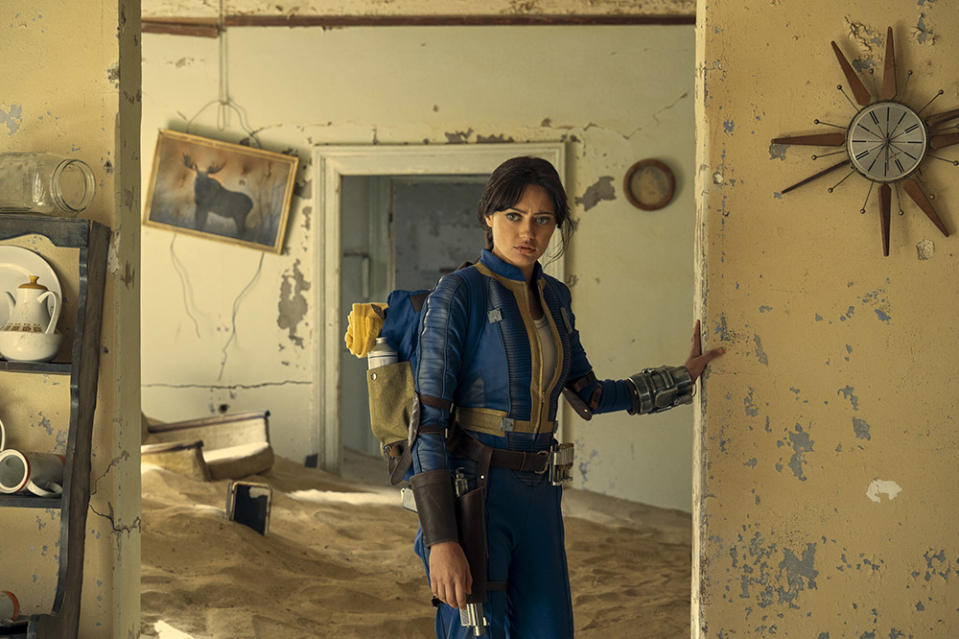
Well, you also got over your Yellowjackets FOMO by joining another smash hit in Fallout. That’s a simple and easy way to cheer yourself up.
(Laughs.)
When Fallout’s audition came your way, did you have to jump through a lot of hoops?
Not as many hoops as you would think, which was hugely flattering, but also quite nerve-wracking. My first introduction to this show was when I had a meeting with [EP-director] Jonah [Nolan], [co-showrunners] Geneva [Robertson-Dworet] and Graham [Wagner], and before they would even send me the script, they wanted to just get on the phone and talk about it. They wanted to really convey the tone because it is so specific, and you can’t just do a straight reading of those scenes. It would be a waste of time. You have to understand the tone, so I did that and then I did a Zoom audition. And Zoom auditions are always not great. Someone is always on mute, there’s a lag and it’s just always awkward. But I did a Zoom audition and then, a week later, I found out on Valentine’s Day [in 2022].
Romantic!
I know! It was very romantic: “Happy Valentine’s, babe. I’m going to be away for 12 months.” (Laughs.) So it was obviously very flattering. I thought I’d have to screen test and get flown out and do all these things, but they were like, “No, it’s you.” And I was very nervous to hear that. My first words were, “Are you sure you don’t want me to audition again, just to make sure?” But here we are, somehow.
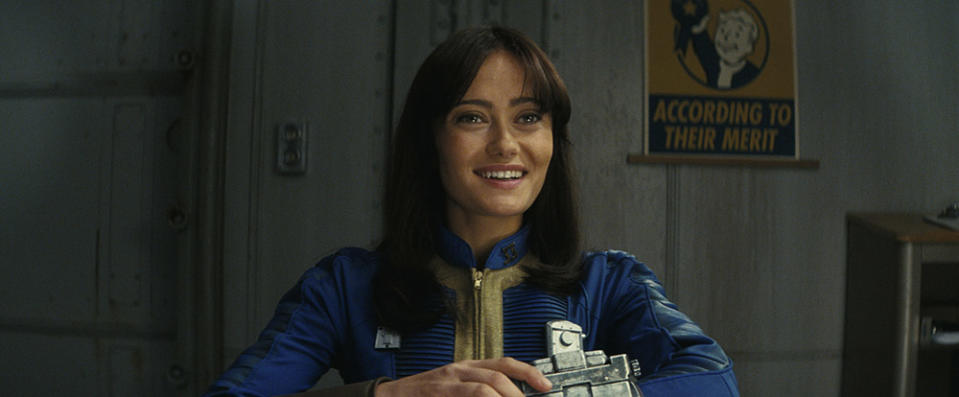
Lucy is a woman out of time due to being a Vault Dweller. Like Cooper Howard (Walton Goggins) in 2077, she feels like she’s from the 1950s. She has these classical ideals, although some of them are heavily skewed in her subterranean world. Her dynamic in the wasteland also reminds me of when small-town Midwesterners visit big cities here in the States, and their brand of friendliness is unreturned by urbanites. Did you actually approach her as if she was a human time capsule?
It’s something I thought about quite a lot, but they were very clear with me that she’s not a ‘50s character. She doesn’t look particularly ‘50s compared to other characters in the Vault, even though Vault 33’s style is this sort of ‘50s, ‘60s thing. She’s not particularly like that, and also accent wise, I was asked to just do the most modern, generic American that I can. It’s always going to sound a little bit Midwestern just because of the way Lucy does talk, but that’s not to say we’re putting on some sort of ‘50s, ‘60s transatlantic thing. Her mannerisms and the way she holds herself, because it’s so polite, are reminiscent of a different era, and that’s not intentional. I suppose it’s just a side effect, and like you say, the customs of Vault Dwellers, at least in Vault 33, are reminiscent of an era because people are taking on more traditional roles.
But, they’re not taking on those roles out of a lack of choice. They’re taking on those roles because of science. It’s the incredibly futuristic idea of repopulating the world after a nuclear apocalypse. So they’ve taken this full circle route to get back to these traditional gender norms of marriage and procreation and all of that. It doesn’t feel as regressive as you might think. I actually felt that Lucy’s attitude toward sex was quite empowering. It feels very feminist in that she’s reclaiming her role, and her sexuality and her duty. It’s a patriotic, almost religious, duty rather than a lack of options or an expectation.
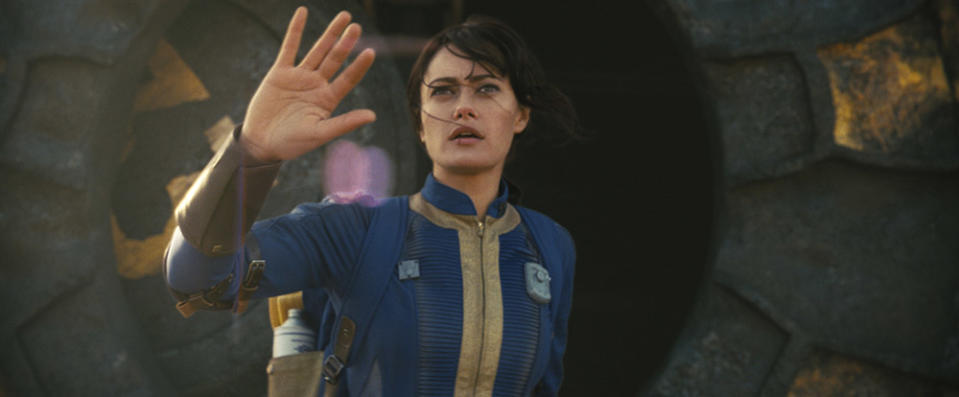
Have you thought about how she’ll react to the discovery that The Ghoul/Cooper Howard is the original Vault-Tec mascot?
Yeah, I have. One of the things I love about TV is that you don’t know what’s going to happen — unless you’ve got lovely showrunners who tell you everything, which has never been my experience. In my experience, showrunners never tell you anything, and then you just read the script until you have to completely recalibrate what you were doing. It’s challenging, but it’s also fun. So I spent most of my time as Lucy just hating the Ghoul, and then, in the last episode, stupidly, it occurred to me far too late that the story that they were really trying to tell was how similar Lucy and the Ghoul are. It lined up with Lucy’s realization that her statement, “I may look like you, but I’ll never be like you,” may not be 100 percent true. So that realization came at a great time, but I don’t know what’s going to happen in season two and I’m very excited to find out. But, if and when Lucy does learn about [Cooper’s Vault-Tec history], it’s only going to further reinforce her understanding that people change on the wasteland. And if he was that once upon a time, then what’s she in for?
To me, her arc can be summed up in three line deliveries. In the series premiere, she cautiously yet optimistically says, “Okey dokey,” when she embarks on her rescue mission. In 104, she goes through a harrowing experience after the Ghoul trades her to the Organ Harvesters. And while she’s clearly traumatized, she still imposes her fundamental kindness by giving him the chems he needs to live and saying, “Golden rule, motherfucker.” She’s beaten down, but she’s still Lucy.
Mm-hmm.
But then, in the finale, her concluding, “Okey dokey,” is utterly despondent. Did the Ghoul and Dr. Wilzig’s (Michael Emerson) prophecies come true? Is she now transformed, at least psychologically?
I really don’t have any autonomy over this character. I do what the writers write for me, and I always find a way to make it work, and I always find a way to justify it. So the answer that I give you could turn out to be completely wrong when we all watch season two in however long it takes to come out. But in my head, I don’t know. Part of me thinks she’ll always be Lucy, and the other part of me wonders how anyone can survive that betrayal and hurt and trauma. Her entire world has just been ripped apart and ripped at the seams. It crumbled in front of her in a second. She’s always had such strong core beliefs, but they were rooted in her dad. So, when you take away that base foundation, I just don’t know how she’ll fare, I just don’t know.
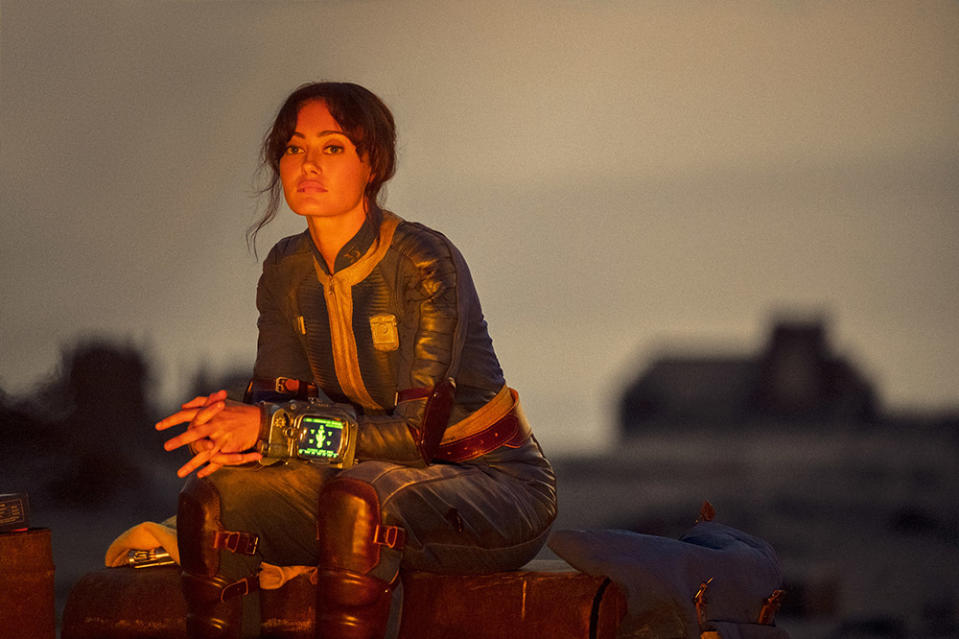
That’s been one of the central questions, if not the central question, of the whole series: whether Lucy can stay decent in the wasteland. She probably needed to shed some of her naïvete, but it’s tragic to think that her original self is gone.
I know, it’s heartbreaking. But, if you think about all the different versions of yourself that you’ve been, most people have one big moment or many moments in their lives that have defined them, and they’ve usually come as symbols. You get a choice that you have to weigh up: You get a big opportunity to move out of the city and do your dream job, or you get the chance to marry the love of your life. So that’s what Lucy has when the Ghoul says, “If you stay here, the Brotherhood will kill you, or you can come with me and meet your makers.” So I feel like this is the defining moment for Lucy. Whatever happens next, whomever she turns into, it’s going to be what she was always meant to be, without sounding too spiritual. It’s what she always had inside her. It’s who she always was. My hope is that when this show is over and done with — after however many total seasons we’re blessed with — people will watch it all over again and see moments, from the very beginning, of who Lucy ends up becoming. If I can make that happen, I’ve won, but I don’t know I’m going to do it.
A lot of the climactic scene inside the Griffith Observatory is her listening and processing. How much of her thought process did you figure out in that long stretch where she’s being appealed to by Moldaver (Sarita Choudhury), Hank (Kyle MacLachlan) and the Ghoul in front of her feral ghoul mother?
Oh God, that was so sad. We actually re-shot that ending a bunch of times. It was hard because we had to find a reaction that felt right for Lucy. But also, because all of these huge things are happening and these big moments are being intercut so rapidly, it had to make sense for the tone overall and what the viewer is experiencing. It also had to be impactful. You have to understand the irreversible change that is happening. What is done cannot be undone from this point, even if everyone is like, “Just kidding!” So it can’t be undone, and we tried big emotional reactions. I tried rage, I tried flipping a switch, and none of it felt authentic.
So we actually re-shot it a few days later, and the writers and I had long and lengthy discussions about what was missing. I had to take inventory of everything Lucy was and everything that she was known for, all of her biggest characteristics, and then just find the opposite of them. And Lucy’s always been a person who takes charge. She always knows what she wants, she always knows what she wants to do and, in this moment, she doesn’t take charge. She’s catatonic, she’s numb, she’s processing, and it’s Maximus [Aaron Morten] that has to shake her out of it.
When something really horrible happens to me, I always think that I’m going to be an action hero about it. But the truth is, when something really shitty did happen to me a few years ago, I was empty. [Writer’s Note: Purnell, who was in the midst of moving, had her U-Haul stolen with all of her worldly possessions inside.] I was literally running through the Rolodex in my brain of like, “Well, I could do this, I could do this and I could do this.” I was coming up with all these different things that I could do, but I couldn’t make my body move. I couldn’t make myself do any of it. It was just this emptiness of, “Well, nothing matters now. You don’t get it. Nothing fucking matters now.” And seeing the most optimistic, hopeful person you’ve ever known — who you truly think is your rock, your anchor, your guiding light, the person who’s never ever going to lose hope, the person you always look to — when that person loses hope, then you’re truly, for lack of a better word, screwed.
Film and television is often shot out of sequence to varying degrees, so is there anything that was shot early or later into production that would surprise us?
Well, that [Griffith Observatory] sequence was right at the very end. I think that was our last week, but for the most part, it was chronological. We did block shooting, with [episodes] one, two and three together. But that sequence was the very last week, and there were a lot of emotions. I was really sad to be finishing and leaving everyone, while also trying to do my best acting.
The scene that took bloody forever — and it makes sense when you watch it — is the Ghoul and Lucy fighting the Gulper in the water. We started that scene in July or August. It was Walton’s first day of work, and we finished that scene on the very last day. I can’t tell you how many separate times we did that scene just because there’s so many parts. There was the big stunt sequence, the fight choreography, and then there was this physical puppet that they built so someone could literally control the Gulper’s head. And then there’s all the CGI elements, the dog, and then you’ve got the Ghoul and his prosthetics. So there was a lot to do, and we had to pick up lots of different pieces on that one. But, luckily, that was my favorite scene to do, and I was very happy about it.
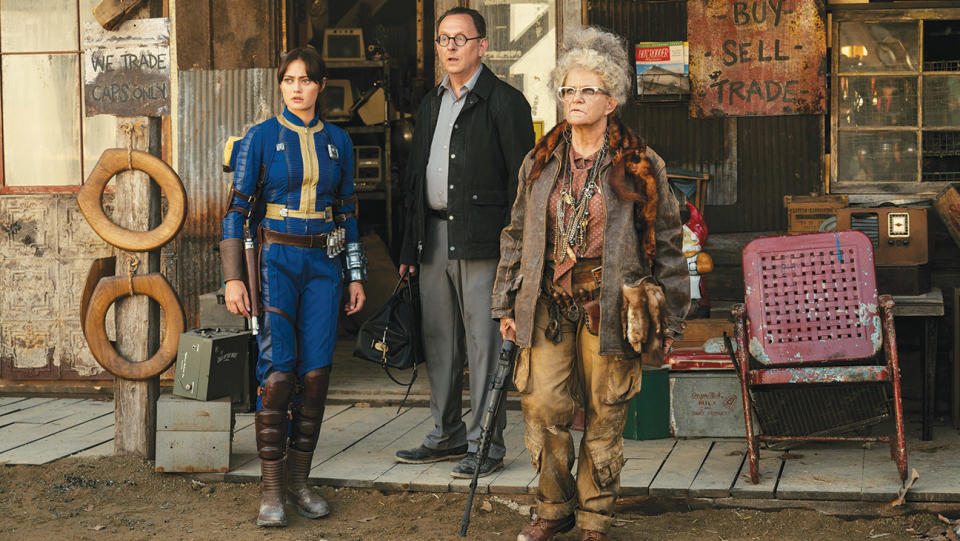
While your Yellowjackets castmates were devouring charred Jackie, you were carrying around a decapitated head that resembled Michael Emerson. How would you review that experience?
(Laughs.) It’s so funny because he barely knows me, but I feel like we’re buddies. We met a few times, and we filmed together for about a week, but he barely knows me. And yet I feel like we are dear, dear friends, because I’ve spent so much time with his head, and that’s not a sentence I ever thought I would say. My buddy, Michael Emerson.
Decades from now, when you’re reminiscing next to a crackling fireplace, what day from Fallout season one will you likely recall first?
That is a great question, and you really set the scene. It would probably be the craziest day of filming that I’ve ever had. We did the consummation scene between man and wife, and then we did the fight scene that happens right after. It was literally in the space of six hours. It’s all we did that morning, and that was my first day of filming. So it was a really unusual way to meet the crew: “Hi everyone, my name’s Ella. This is my husband.” (Laughs.) I was exhausted by the end of the day. It was a lot, but we got it all done in one day. It was crazy. That was also the first time meeting and working with Jonathan Nolan, properly.
For all the trauma that Lucy went through, the trauma of having to kill her first husband and first sexual partner within an hour or two of meeting him didn’t linger all that long.
(Laughs.) She even got stabbed in the stomach, so it was just your average Monday. She really went through it.
***
Fallout is now available on Amazon Prime Video.
Best of The Hollywood Reporter

 Yahoo News
Yahoo News 
